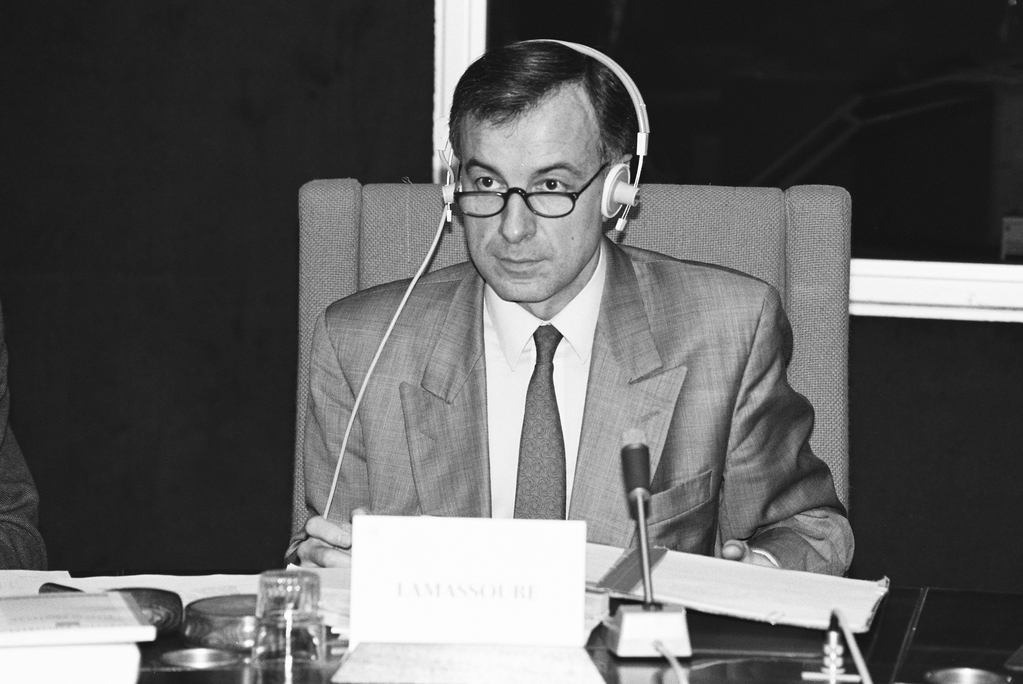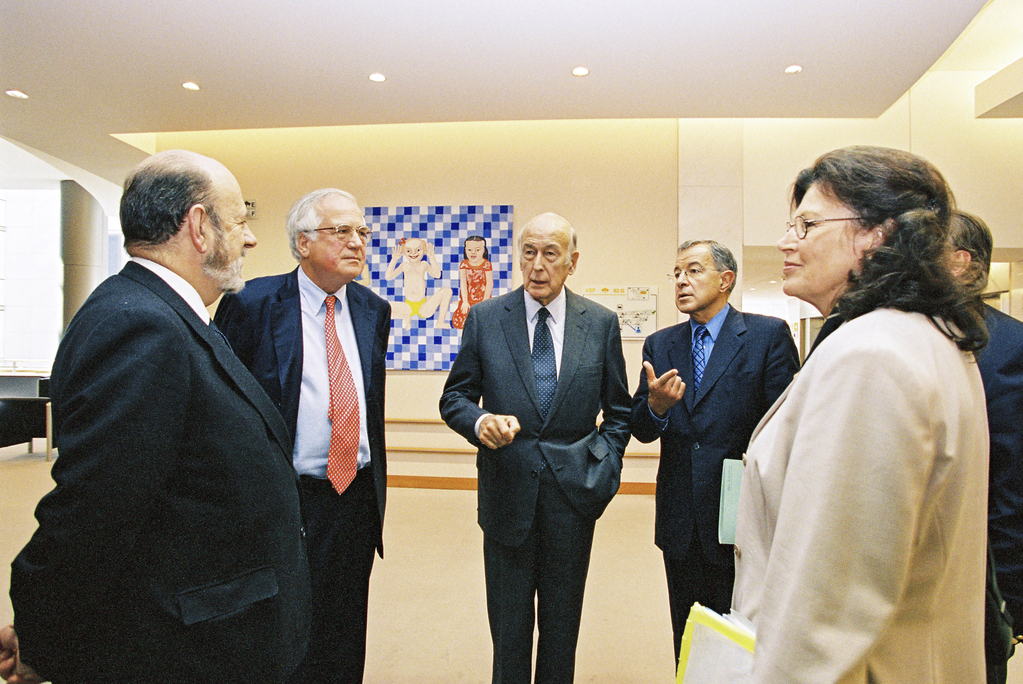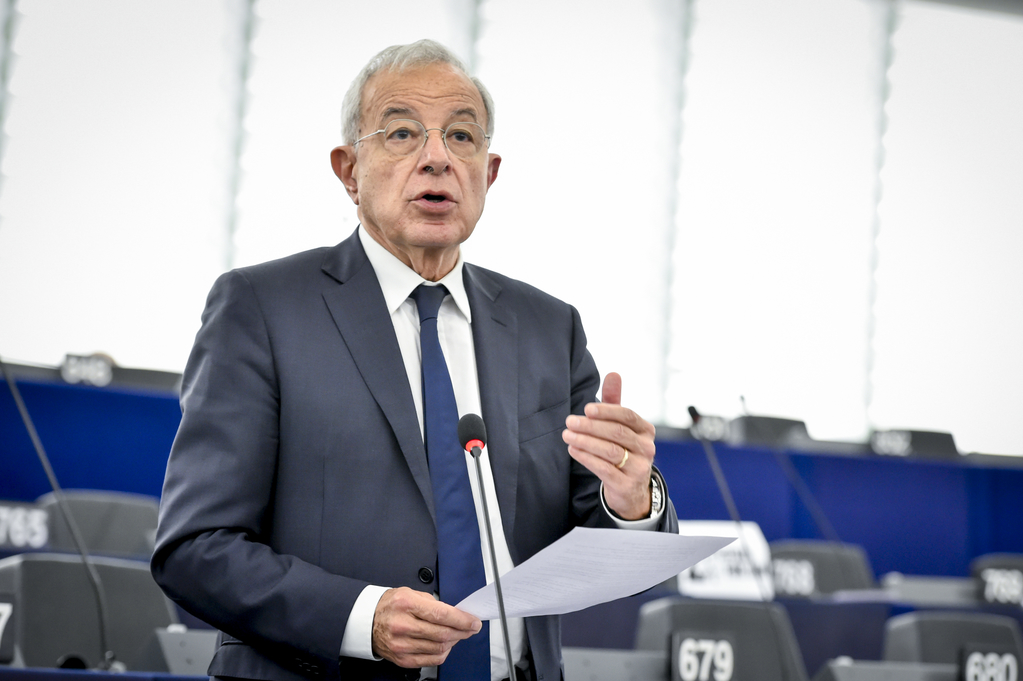Political groups
1989-1991: Liberal and Democratic Reformist Group
1991-1993: Group of the European People's Party (Christian-Democratic Group)
1999-2009: Group of the European People's Party (Christian Democrats) and European Democrats
2009-2019: Group of the European People's Party (Christian Democrats)
National parties
1989-1993: Union pour la démocratie française - Clubs Perspectives et Réalités
1999-2003: Union pour la démocratie française
2003-2015: Union pour un Mouvement Populaire
2015-2017: Les Républicains
2017-2019: Indépendant
Biography
Alain Lamassoure was born in Pau, France. He graduated from Sciences-Po Paris and is a former student at the National School of Administration (Turgot Promotion). He began his career in 1968 at the Court of Auditors as an auditor and continued working as a legal adviser. From 1973 onwards, he was a special advisor to Maurice Druon, Minister for Cultural Affairs from 1973 to 1974, and later became technical adviser in the office of the Minister for Finance (1974-1976) and the Minister for Infrastructure (1977-1978). He continued his career as a senior official in the office of the President of the Republic at the end of Valéry Giscard d’Estaing's term of office (1978-1981).
National Activity
Alain Lamassoure was a Member of the National Assembly from 1986 to 1993, representing the department Pyrénées-Atlantiques. In 1993, he was appointed Minister delegate for European Affairs in the Government of Édouard Balladur while François Mitterrand was President of the Republic. Under the presidency of Jacques Chirac and Prime Minister Alain Juppé, he worked as Minister delegate for the Budget and as government spokesperson from 1995 to 1997. From 1993 to 1997, these functions were linked to France’s preparations for the Euro, preparations for the 1995 enlargement, the French presidency of the European Union in 1995, and the negotiation of the Amsterdam Treaty and the Stability Pact.
At local level, Lamassoure was First Deputy Mayor of Anglet from 1995 to 1999, then Mayor from 1999 to 2000, and a member of the Anglet Municipal Council until 2008.
From 1995 to 2014, he was a regional councillor for Aquitaine. In 1995, he became president of the Bayonne-Anglet-Biarritz Agglomeration Community, a position he held until 2001. He was then president of the Council of Elected Representatives of the Basque Country until 2008.
 Alain Lamassoure at the constitutive meeting of the Committee on Budgetary Control © European Communities 1992 - European Parliament
Alain Lamassoure at the constitutive meeting of the Committee on Budgetary Control © European Communities 1992 - European Parliament
A former member of the Union for French Democracy, which was founded by Valéry Giscard d’Estaing when he was President of the Republic, Lamassoure, joined the Union for a Popular Movement (UMP) upon its creation in 2002. From 2004, he was a national secretary in charge of European affairs. He was part of the governing bodies of the Democratic Convention as Secretary-General.
In March 2017, in the Fillon affair, he rescinded his support for the Les Républicains (former UMP) presidential candidate François Fillon. In October 2017, following the decision of the Republican Political Bureau to exclude so-called ‘constructive’ MPs and ministers, he announced that he was leaving his party.
He is a member of the European Movement France of which he was formerly vice-president and has close links with various European federalist groups. He is also a Knight of the National Order of the Legion of Honour.
He is currently Chairman of the Governing Board of the Observatory on History Teaching in Europe.
European Activities
Lamassoure's commitment to Europe is demonstrated through his work as an MEP. He held a seat at the European Parliament during the 3rd, 5th, 6th, 7th, and 8th parliamentary terms. He was the spokesperson of the French delegation to the European People’s Party (EPP) Group and longstanding member of the Bureau of the EPP Group.
His activities as an MEP were mainly focused on financial, budgetary and institutional issues.
Lamassoure was Chair of the Committee on Budgetary Control (1992-1993), Chair of the Committee on Budgets (2009-2014), and Chair of the Special Committee on Tax Rulings and Other Measures Similar in Nature or Effect (2015-2016),
He was Vice-Chair of the Committee on Budgets (1990-1992), Vice-Chair of the Delegation for relations with the Maghreb countries and the Arab Maghreb Union (1992-1993), and Vice-Chair of the Delegation for relations with South Africa (1999-2002).
He was member of the Committee on Budgets, the Committee on Budgetary Control, the Committee on Energy, Research and Technology, the Committee on Industry, External Trade, Research and Energy, the Committee on Economic and Monetary Affairs, the Committee on Foreign Affairs, Human Rights, Common Security and Defence Policy, the Temporary committee on policy challenges and budgetary means of the enlarged Union 2007-2013, the Special committee on the policy challenges and budgetary resources for a sustainable European Union after 2013, the Special Committee on Tax Rulings and Other Measures Similar in Nature or Effect, the Committee of Inquiry to investigate alleged contraventions and maladministration in the application of Union law in relation to money laundering, tax avoidance and tax evasion, and the Committee on Constitutional Affairs.
He was member of several Delegations, including the Delegation for relations with the countries of South Asia and the South Asia Association for Regional Cooperation (SAARC) and the Delegation for relations with India.
Lamassoure is the author of several reports on own resources and the EU budget and on relations between the EU and the Member States. In 2002 and 2003, he participated in the work of the Convention on the Future of Europe. From 2002 to 2005, he was Vice-President of the European Movement France and from 2005 to 2013, he was Vice-President of the Cercle de l’Industrie, which ‘contributed to the articulation of a new industrial policy and improved economic governance in Europe’. In March 2007, it published a report which, in denouncing the shortcomings of the European Union’s financing system, Lamassoure called for own resources.
 Constitutional Affairs Committee meeting: 'Debate on the future of Europe'. L-R: José María Gil-Robles Gil-Delgado, Karl von Wogau, Valéry Giscard d'Estaing, Alain Lamassoure, Charlotte Cederschiold.© European Communities 2001
Constitutional Affairs Committee meeting: 'Debate on the future of Europe'. L-R: José María Gil-Robles Gil-Delgado, Karl von Wogau, Valéry Giscard d'Estaing, Alain Lamassoure, Charlotte Cederschiold.© European Communities 2001
In 1992, during the 3rd parliamentary term, he took part in the discussions on the constitutional law of 25 June, which was necessary for the introduction into national law of the Maastricht Treaty on European Union. He tabled a parliamentary amendment to Article 88-1 of the Constitution, which stated that “the Republic shall participate in the European Communities and the European Union, made up of States which have freely chosen, by virtue of the Treaties which established them, to exercise jointly some of their powers”. This amendment would have far-reaching consequences for future French constitutional and administrative case law. According to Grand Judgments of Administrative Case Law, that article has served as a basis for case law of the Conseil Constitutionnel (Constitutional Council), which is the guiding principle of the Arcelor case law of the Conseil d’État (Council of State).
In 2008, Nicolas Sarkozy, President of the French Republic, requested a report from Lamassoure on the effective application of Community law in the daily life of citizens, in preparation for the French Presidency of the Council of the European Union, which began on 1 July 2008. In his report on 27 June 2008, Lamassoure called for better application of European rules in France.
In 2014, he began piloting the European project of Alain Juppé, who he supported for the presidential primary of the right and centre of 2016. Though the declared candidate for the succession of Martin Schulz as President of the European Parliament in 2017, he was prevented from acceding to this role following the defeat of Alain Juppé by François Fillon.
At the end of his last term of office, he was appointed Chairman of the Scientific Council of the Robert Schuman Foundation.
For more information on his time as an MEP, click here.
What's in the archives?
The fonds of Alain Lamassoure are rich and complex, reflecting Lamassoure’s sustained work during his term of office. Similar to the majority of his colleagues, the fonds are structured around three major activities: parliamentary work, political activities and correspondence. In the first two series, the organisation follows mainly the duties occupied by Lamassoure during his various terms of office, namely the 6th (2004-2009), 7th (2009-2014) and 8th parliamentary term (2014-2019), with an emphasis on the 8th parliamentary term. The 3rd (1989-1994) and 5th parliamentary terms (1999-2004) are not included in this index.
The fonds reflect Lamassoure’s preferred topics (economy, finance, constitutional affairs and past and present European dimension) and his activity as Chair of the Committee on Budget and the Special Committee on Tax Rulings and Other Measures Similar in Nature or Effect, as well as his activity as Member of the Committee on Economic and Monetary Affairs, the Committee of Inquiry to investigate alleged contraventions and maladministration in the application of Union law in relation to money laundering, tax avoidance and tax evasion, as well as the Committee on Constitutional Affairs.
The fonds also testify to Lamassoure’s huge investment in workload, as shown by the numerous thematic files that make up the initial deposit with the largest files being tax rulings (Special Committee on Tax Rulings and Other Measures Similar in Nature or Effect - TAXE/TAX2) and the citizens’ initiative (Committee on Constitutional Affairs). A few archives report on activities at national level, such as the preparation of European elections or letters from interest groups in his constituency (Aquitaine).
Finally, the third part is devoted to the large number of letters received and sent by Alain Lamassoure.
 Alain Lamassoure speaks in a plenary debate on the Common Consolidated Corporate Tax Base in Strasbourg © European Union 2018 - European Parliament
Alain Lamassoure speaks in a plenary debate on the Common Consolidated Corporate Tax Base in Strasbourg © European Union 2018 - European Parliament